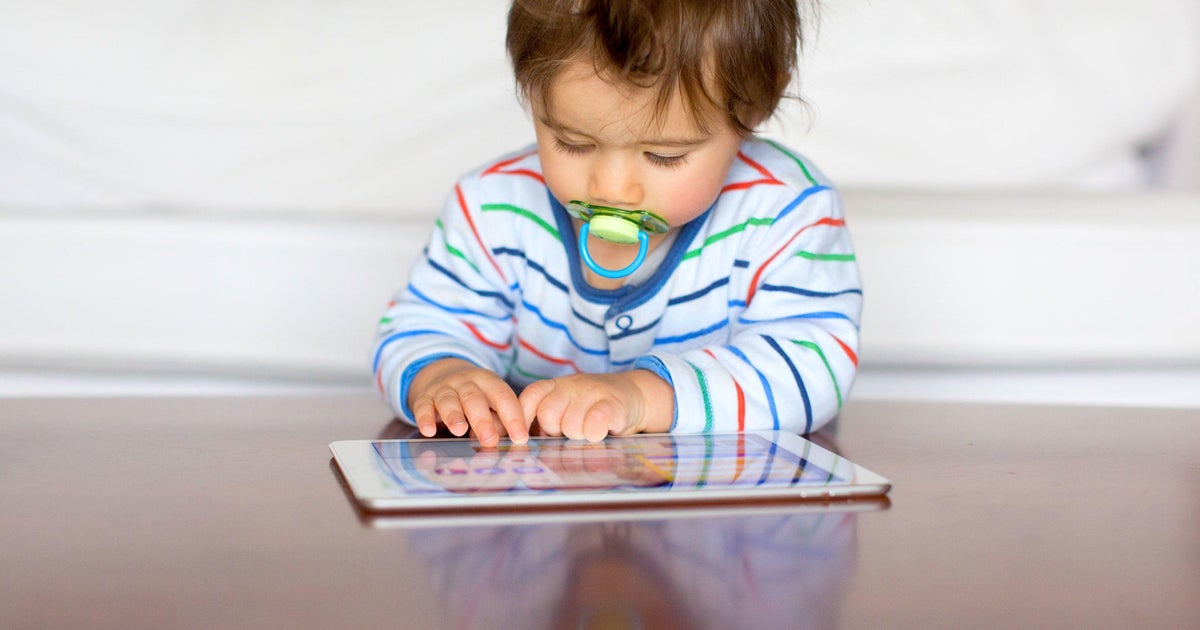MIAMI – Handing your child a cell phone or pill to engage in with may perhaps appear to be like a harmless solution when you happen to be occupied, but it could quickly impact their advancement, a new research has identified.
Acquiring everywhere from a person to four hours of monitor time for each working day at age 1 is joined with greater pitfalls of developmental delays in interaction, good motor, challenge-solving, and personalized and social abilities by age 2, according to a research of 7,097 young children printed Monday in the journal JAMA Pediatrics.
“It’s a genuinely significant examine simply because it has a incredibly big sample sizing of kids who’ve been adopted for various decades,” stated Dr. Jason Nagata, associate professor of pediatrics at the College of California, San Francisco, who wasn’t included in the review.
“The review fills an crucial gap since it identifies unique developmental delays (in expertise) this sort of as interaction and problem-fixing associated with screen time,” said Nagata, noting there haven’t been quite a few prior reports that studied this difficulty with many years of stick to-up knowledge.
The kids and their mothers were being element of the Japan-based mostly Tohoku Health care Megabank Undertaking Delivery and Three-Era Cohort Examine and had been recruited from 50 obstetric clinics and hospitals in the Miyagi and Iwate prefectures between July 2013 and March 2017.
The review calculated how many hours kids employed screens per working day at age 1 and how they executed in several developmental domains – communication expertise, high-quality motor competencies, own and social skills, and difficulty-resolving expertise – at ages 2 and 4. Both equally actions were according to the mothers’ self-stories.
By age 2, those who had had up to four several hours of display time per working day ended up up to three occasions more very likely to expertise developmental delays in conversation and issue-fixing competencies.
Those people who experienced invested 4 or far more several hours with screens had been 4.78 times a lot more very likely to have underdeveloped communication competencies, 1.74 instances extra probably to have subpar great motor abilities, and two situations far more probable to have underdeveloped personalized and social expertise by age 2. By age 4, the possibility remained only in the conversation and challenge-fixing classes.
“1 of the spots that is somewhat understudied in the complete display screen time literature is seeking at impacts of monitor exposure on extremely youthful youngsters, specifically when screens are introduced to toddlers,” explained Dr. John Hutton, affiliate professor of common and local community pediatrics at Cincinnati Children’s Healthcare facility Clinical Center, who was not included in the research. “It really is surely a world wide worry, and I consider the conclusions (listed here) really should apply to, definitely, other nations around the world as perfectly.”
How monitor time could affect advancement
The possible harms of screen time on communication skills might have to do with children becoming robbed of drivers for language advancement, Hutton reported.
“Youngsters find out how to talk if they’re encouraged to converse, and incredibly frequently, if they are just watching a display screen, they’re not owning an chance to apply talking,” he reported. “They could hear a ton of words, but they’re not practising saying a ton of words or obtaining a good deal of that again-and-forth conversation.”
Engineering use can consider time absent from interpersonal interactions that nurture social techniques considering that actual persons are a lot more multidimensional than figures on a display, Hutton additional. Hunting at people’s faces is when our brains change on to figure out how to interact with them.
“Also, (with) passive monitor viewing that doesn’t have an interactive or actual physical part, young children are a lot more probably to be sedentary and then usually are not ready to practice motor skills,” Nagata explained.
If little ones do not have more than enough time to participate in or are handed a pill to pacify adverse thoughts, that could avert the crucial developmental milestone which is the ability to navigate soreness.
“For a longer period phrase, one of the actual aims is for youngsters just to be equipped to sit quietly in their individual thoughts,” Hutton explained. “When they’re permitted to be a tiny little bit bored for a second, they get a little not comfortable, but then they are like, ‘OK, I want to make myself a lot more at ease.’ And that’s how creativity happens.”
There are other elements that can have an affect on a child’s improvement, these kinds of as genetics, adverse ordeals this kind of as neglect or abuse, and socioeconomic variables, Nagata claimed.
In the most up-to-date investigate, moms of children with higher concentrations of screen time have been a lot more very likely to be younger, have never ever given beginning just before, have a reduced household cash flow, have a lessen schooling amount and have postpartum melancholy.
The study does have restrictions. Because of to social desirability bias – wanting to say the “ideal” or socially appropriate issue – mom and dad may well underreport their kid’s monitor time and overreport how their boy or girl is doing developmentally, gurus stated.
Additionally, the authors didn’t have aspects on what children’s monitor time associated, and not all types are equal in their potential to damage or advantage, specialists stated.
“The other problem that is usually seriously vital is, is the mum or dad looking at with the boy or girl?” Hutton reported. “When a parent is observing with a baby, that tends to mitigate a lot of the negatives.”
More healthy methods to occupy your baby
If you have to have to preserve your toddler hectic so you can get matters performed or have some solitude, try out offering them a reserve, coloring components, or toys, gurus claimed. They can even in some cases delight in these activities though secured in a highchair.
If you need to have to rely on screens from time to time, choose for academic content material or video clip chats with a beloved a person so they can even now get some social interaction, Nagata explained.
A person concern with some on the web kid’s articles is that mother and father will consider it really is educational for the reason that it really is marketed as this kind of and has a lot of facts about the alphabet, shades, numbers or animals their kids can see and hear, Hutton mentioned. But what jumpstarts learning is material that aids children implement their awareness past just rote memorization – so they can “navigate the actual environment, in which factors are more unpredictable and involve additional creativeness and resilience,” he claimed.
Hutton and Nagata suggested selecting for a longer period movies since viewing lots of small movies could impact children’s interest span and means to have an understanding of what they’re seeing.
Be picky about when you count on display time, and transform units off when they are not in use, Nagata said. “Aimless viewing can also distract young ones from then focusing on an activity that’s at hand or in-individual conversation.”
Furthermore, are living by case in point by not acquiring an too much volume of screen time yourself, given that little ones have a tendency to mimic what they see, gurus said.
The American Academy of Pediatrics suggests looking at the top quality of display screen time fairly than just quantity, but the group does have resources for determining rules and boundaries for your family members – such as its spouse and children media system you can tailor to your individual family’s desires and advice for aiding your youngsters construct healthy habits.
“We require to just sluggish down and … be as very careful and conscious as we can about retaining children anchored in the true planet, which is seriously how we progressed as human beings,” Hutton claimed. “There’s heading to be a good deal of time for display time afterwards as soon as we get a improved perception of who the young ones are and what they need.”



